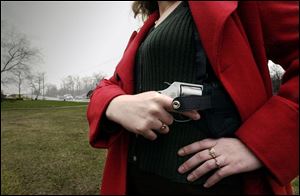
Gun secrecy
6/25/2015
Concealed-carry records are exempt from most of the state’s public records laws. A woman demonstrates how her handgun is concealed.
State lawmakers are trying to sneak a number of pernicious measures into the new two-year budget, hoping Ohioans won’t notice. Among them is a Senate proposal that would revoke journalists’ already highly restricted access to lists of Ohioans who have permits to carry concealed weapons.
The regressive proposal is designed to silence public debate on gun safety and quell media freedoms in Ohio. It must not become part of the final budget.
Like most other states, Ohio shields gun owners from public accountability, ostensibly to protect their privacy and security. Concealed-carry records are exempt from most of the state’s public records laws. No member of the public other than journalists has access to the lists.
Like other pro-gun policies in Ohio and elsewhere, such laws have it backward. One person’s right to carry a gun cannot trump all Ohioans’ safety rights.
To prevent news organizations from publishing the identities of permit holders, state law prohibits journalists from recording information on concealed-carry lists. Reporters can look up individuals on the lists to check, for example, whether someone involved in a shooting was allowed to be carrying a gun, or whether a concealed-carry permit was revoked when it should have been.
The Senate measure would end that practice, barring reporters from seeing concealed-carry lists under any circumstance. It would prevent journalists from doing their jobs and suppress information that is critical to the public interest, as the Ohio Newspaper Association rightly asserts.
The Ohio Supreme Court ruled this year that government officials must have a compelling reason to deny public records requests. They need to show, not merely assert, a legitimate public interest in suppressing records.
But lawmakers don’t seem to have any interest in honoring the intent of open-records laws when it comes to guns. They’ve allowed a minority of pro-gun extremists, who resist any perceived encroachment on their freedom, to impose their will on the entire state.
Compared with some of the other irrational gun bills pending in the General Assembly, the anti-transparency measure practically seems benign. Lawmakers also are considering bills that would make Ohio’s virtually nonexistent gun-control laws even more permissive, including proposals to permit guns in day-care centers and places of worship, and to allow residents to carry guns without a permit at all. Such proposals do not reflect the preferences of Ohioans, most of whom say they support common-sense gun laws.
Lawmakers appear eager to bury their secrecy amendment in the budget, because it so flagrantly flouts principles of public openness and accountability. Access to public gun records doesn’t interfere with anyone’s right to carry a gun. It merely allows citizens to have an informed debate about public safety.